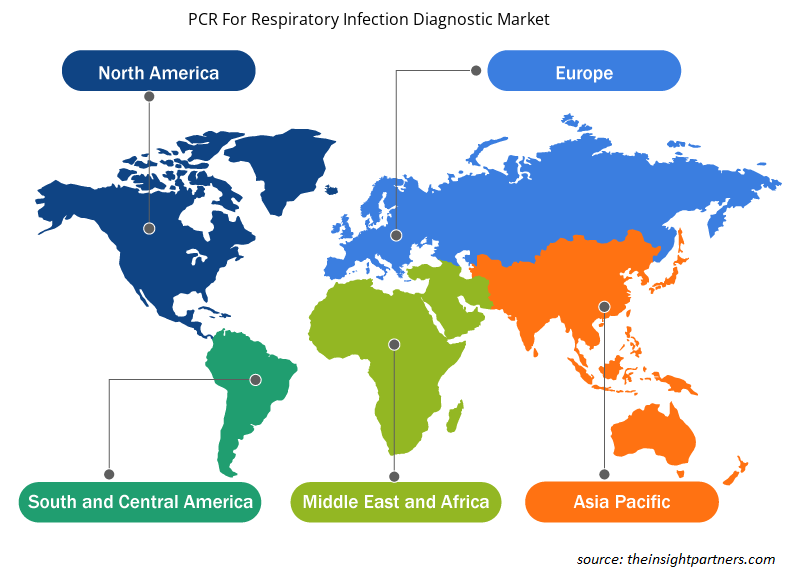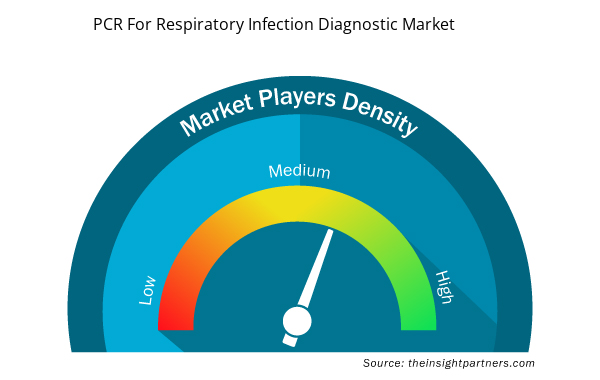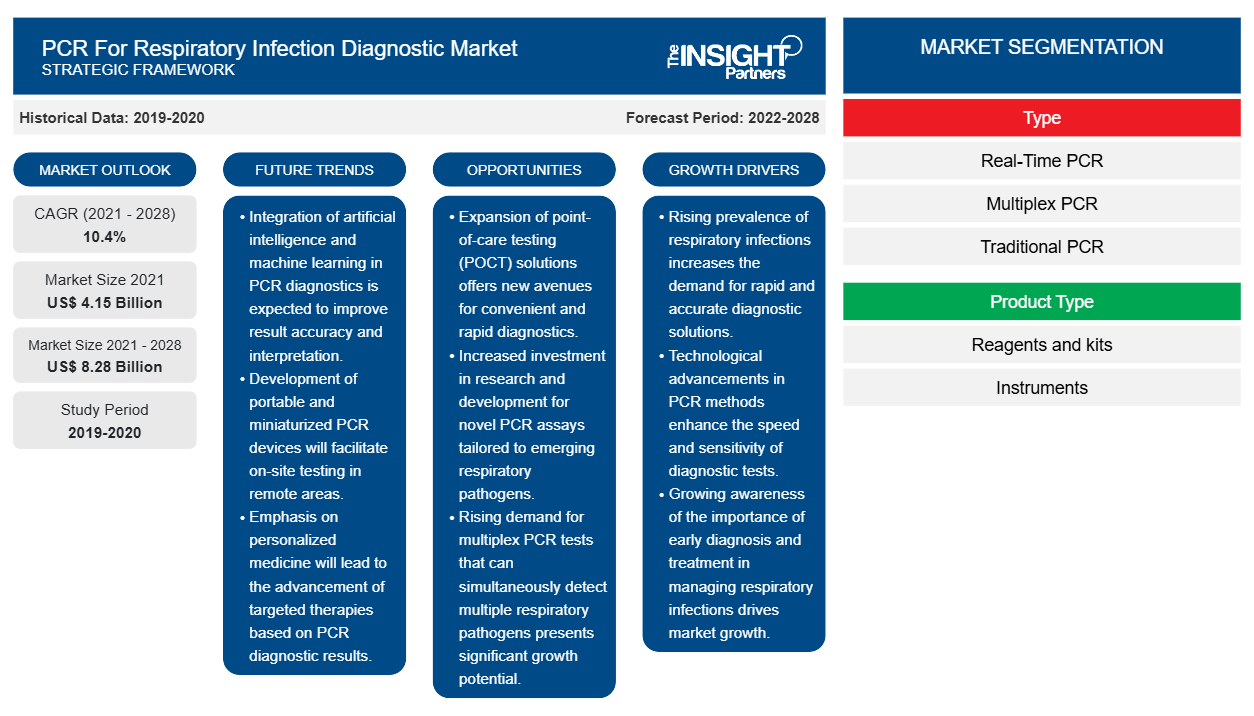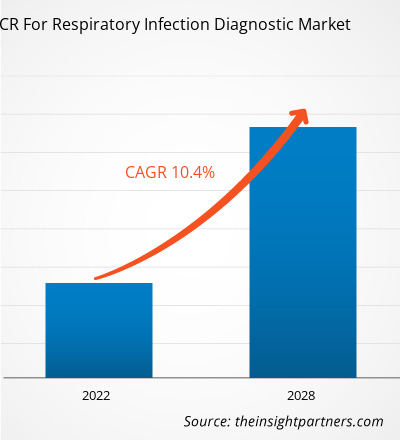El mercado de PCR para diagnóstico de infecciones respiratorias se valoró en US$ 8279,32 millones en 2028 desde US$ 4146,02 millones en 2021; se estima que crecerá a una CAGR del 10,4% entre 2021 y 2028.
La reacción en cadena de la polimerasa (PCR) se utiliza para realizar diagnósticos precisos en el punto de atención que ayudan a identificar y determinar rápidamente la causa de las infecciones del tracto respiratorio. Además, la PCR es ampliamente preferida en entornos hospitalarios y ambulatorios, lo que ayuda a impulsar el crecimiento del mercado en los últimos años.
El crecimiento del mercado de PCR para el diagnóstico de infecciones respiratorias se atribuye a factores como la creciente carga de enfermedades respiratorias crónicas (ERC), los avances en las pruebas de PCR, que están mejorando ampliamente el rendimiento de los dispositivos médicos. Sin embargo, el uso de pruebas de PCR para diversos diagnósticos de infecciones respiratorias y los avances en la tecnología de PCR que se utilizan para obtenerlas. La disponibilidad de ensayos alternativos obstaculiza el crecimiento del mercado.
Personalice este informe según sus necesidades
Obtendrá personalización en cualquier informe, sin cargo, incluidas partes de este informe o análisis a nivel de país, paquete de datos de Excel, así como también grandes ofertas y descuentos para empresas emergentes y universidades.
- Obtenga las principales tendencias clave del mercado de este informe.Esta muestra GRATUITA incluirá análisis de datos, desde tendencias del mercado hasta estimaciones y pronósticos.
Perspectivas del mercado
Estrategias de consolidación de mercado adoptadas mediante el uso de pruebas PCR para el diagnóstico de diversas infecciones respiratorias
Las pruebas de PCR son el estándar de oro para detectar enfermedades infecciosas respiratorias, incluido el SARS-CoV-2. Además, los crecientes avances en PCR no se limitan a las pruebas de COVID-19. Los continuos avances tecnológicos han permitido a los investigadores desarrollar técnicas de PCR avanzadas a un costo reducido y limitar sus complejidades. Se espera que las pruebas de PCR mejoren sus capacidades para el diagnóstico molecular y fortalezcan su papel en el futuro con los avances en curso de tecnologías como la microfluídica y la secuenciación de próxima generación . Además, las pruebas de PCR se utilizan significativamente en instituciones como hogares de ancianos, centros de atención crónica y hospitales, para identificar la infección por el virus de la influenza que causa brotes respiratorios.
Además, las infecciones respiratorias agudas y crónicas se encuentran entre las principales causas de morbilidad en los países desarrollados y en desarrollo a nivel mundial. Se estima que las enfermedades respiratorias agudas representan casi el 75% de la morbilidad aguda total a nivel mundial. Por lo tanto, varias empresas ofrecen diversos kits de PCR que pueden detectar la presencia de patógenos que causan enfermedades respiratorias. Por ejemplo, empresas como bioMérieux SA y altona Diagnostics GmbH ofrecen una amplia gama de kits de PCR que pueden detectar infecciones respiratorias agudas en el tracto respiratorio superior o inferior. Aparte de la creciente incidencia de enfermedades respiratorias agudas y crónicas, es probable que otros factores como las condiciones ambientales y climáticas, la contaminación del aire y los descubrimientos de nuevas bacterias, virus y patógenos sirvan como oportunidades de crecimiento vitales para las pruebas de PCR para el diagnóstico de infecciones respiratorias en el futuro próximo.
Perspectivas basadas en tipos
El mercado de PCR para el diagnóstico de infecciones respiratorias, por tipo, se segmenta en PCR en tiempo real (qPCR), PCR multiplex, PCR tradicional, PCR digital, transcriptasa inversa (RT-PCR) y otros. El segmento de PCR en tiempo real (qPCR) tuvo la mayor participación del mercado en 2021 y se prevé que registre la CAGR más alta del mercado durante el período de pronóstico.
Información basada en el tipo de producto
Según el tipo de producto, el mercado de PCR para el diagnóstico de infecciones respiratorias se segmenta en reactivos y kits, instrumentos y otros. El segmento de reactivos y kits tuvo la mayor participación del mercado en 2021 y se prevé que registre la CAGR más alta del mercado durante el período de pronóstico.
Información basada en el tipo de infección
Según el tipo de infección, el mercado de PCR para el diagnóstico de infecciones respiratorias se segmenta en infecciones bacterianas, infecciones virales, hongos y otros patógenos. En 2021, el segmento de infecciones virales tuvo la mayor participación del mercado y se estima que registrará la CAGR más alta del mercado durante el período de pronóstico.
Información basada en los usuarios finales
Según el usuario final, el mercado de PCR para el diagnóstico de infecciones respiratorias está segmentado en hospitales, clínicas médicas, laboratorios clínicos, instituciones académicas y de investigación, empresas biotecnológicas y farmacéuticas, entre otros. En 2020, el segmento de laboratorios clínicos tuvo la mayor participación del mercado y se estima que registrará la CAGR más alta del mercado durante el período de pronóstico.
Los lanzamientos y aprobaciones de productos son estrategias que las empresas suelen adoptar para ampliar su presencia global y sus carteras de productos. Además, los actores del mercado de reconstrucción mamaria se centran en la estrategia de colaboración para ampliar su clientela, lo que, a su vez, les permite mantener su marca a nivel mundial.
Perspectivas regionales del mercado de PCR para el diagnóstico de infecciones respiratorias
Los analistas de Insight Partners explicaron en detalle las tendencias y los factores regionales que influyen en el mercado de PCR para el diagnóstico de infecciones respiratorias durante el período de pronóstico. Esta sección también analiza los segmentos y la geografía del mercado de PCR para el diagnóstico de infecciones respiratorias en América del Norte, Europa, Asia Pacífico, Oriente Medio y África, y América del Sur y Central.

- Obtenga datos regionales específicos para el mercado de PCR para diagnóstico de infecciones respiratorias
Alcance del informe de mercado de PCR para diagnóstico de infecciones respiratorias
| Atributo del informe | Detalles |
|---|---|
| Tamaño del mercado en 2021 | US$ 4,15 mil millones |
| Tamaño del mercado en 2028 | US$ 8,28 mil millones |
| CAGR global (2021-2028) | 10,4% |
| Datos históricos | 2019-2020 |
| Período de pronóstico | 2022-2028 |
| Segmentos cubiertos | Por tipo
|
| Regiones y países cubiertos | América del norte
|
| Líderes del mercado y perfiles de empresas clave |
|
Densidad de actores del mercado de PCR para diagnóstico de infecciones respiratorias: comprensión de su impacto en la dinámica empresarial
El mercado de PCR para el diagnóstico de infecciones respiratorias está creciendo rápidamente, impulsado por la creciente demanda de los usuarios finales debido a factores como la evolución de las preferencias de los consumidores, los avances tecnológicos y una mayor conciencia de los beneficios del producto. A medida que aumenta la demanda, las empresas amplían sus ofertas, innovan para satisfacer las necesidades de los consumidores y aprovechan las tendencias emergentes, lo que impulsa aún más el crecimiento del mercado.
La densidad de actores del mercado se refiere a la distribución de las empresas o firmas que operan dentro de un mercado o industria en particular. Indica cuántos competidores (actores del mercado) están presentes en un espacio de mercado determinado en relación con su tamaño o valor total de mercado.
Las principales empresas que operan en el mercado de PCR para diagnóstico de infecciones respiratorias son:
- Abad
- F. Hoffmann-La Roche AG
- Fabricante: Hologic, Inc.
- Compañía Seegene Inc.
- AusDiagnóstico
Descargo de responsabilidad : Las empresas enumeradas anteriormente no están clasificadas en ningún orden particular.

- Obtenga una descripción general de los principales actores clave del mercado de PCR para diagnóstico de infecciones respiratorias
Por tipo
- PCR en tiempo real (qPCR)
- PCR multiplexada
- PCR tradicional
- PCR digital
- Transcriptasa inversa (RT-PCR)
- Otros
Por tipo de producto
- Reactivos y kits
- Instrumentos
- Otros
Por tipo de infección
- Infecciones bacterianas
- Bordetella
- Neumonía por estreptococo
- Estafilococo áureo
- Haemophilus influenzae
- Moraxella catarrhalis
- Neumonía por micoplasma
- Chlamydophila neumoniae (neumonía por clamidia)
- Legionella
- Otros
- Infecciones virales
- Rinovirus
- Virus de la gripe
- Virus del síndrome respiratorio agudo severo (SARS) CoV-2
- Virus respiratorio sincitial (VSR)
- Adenovirus
- Enterovirus
- Parainfluenza
- Metaneumovirus humano (hMPV)
- Otros
- Hongos y otros patógenos
Por el usuario final
- Hospitales
- Clínicas médicas
- Laboratorios clínicos
- Instituciones académicas y de investigación
- Empresas biotecnológicas y farmacéuticas
- Otros
Por geografía
- América del norte
- A NOSOTROS
- Canadá
- México
- Europa
- Francia
- Alemania
- Reino Unido
- España
- Países Bajos
- Noruega
- Italia
- Resto de Europa
- Asia Pacífico (APAC)
- Porcelana
- India
- Japón
- Australia
- Corea del Sur
- Resto de Asia Pacífico
- Oriente Medio y África (MEA)
- Arabia Saudita
- Emiratos Árabes Unidos
- Sudáfrica
- Resto de Oriente Medio y África
- América del Sur y Central (SCAM)
- Brasil
- Argentina
- Resto de América del Sur y Central
Perfiles de empresas
- Abad
- F. Hoffmann-La Roche AG
- Fabricante: Hologic, Inc.
- Compañía Seegene Inc.
- AusDiagnóstico
- BD
- Laboratorios Bio-Rad Inc.
- BioMérieux
- Qiagen
- Thermo Fisher Scientific Inc
- Análisis histórico (2 años), año base, pronóstico (7 años) con CAGR
- Análisis PEST y FODA
- Tamaño del mercado Valor/volumen: global, regional, nacional
- Industria y panorama competitivo
- Conjunto de datos de Excel



Report Coverage
Revenue forecast, Company Analysis, Industry landscape, Growth factors, and Trends

Segment Covered
This text is related
to segments covered.

Regional Scope
North America, Europe, Asia Pacific, Middle East & Africa, South & Central America

Country Scope
This text is related
to country scope.
Preguntas frecuentes
The growth of the region is attributed to factors such as rising public–private partnerships, and increasing funding activities are widely enhancing the performance of medical devices. Moreover, presence of well-developed healthcare infrastructure and government support are some of the prominent factors propelling the market growth in Asia Pacific. In addition, the Europe is expected account for the fastest growth in the PCR for respiratory infection diagnostics market. A high demand in research, growing support from governments, continuously changing disease profiles, rising public–private partnerships, and increasing funding activities are widely enhancing the performance of medical devices growth of Europe PCR for respiratory infection diagnostics market during the forecast period.
The polymerase chain reaction (PCR) is a simple and low-cost method for amplifying small portions of DNA. Because significant amounts of a sample of DNA are necessary for molecular and genetic analyze, studies of isolated fragments of DNA are almost impossible without PCR amplification.
The growth of the market is attributed to some key driving factors such as as the increasing Burden of Chronic Respiratory Diseases (CRDs), growing developments in PCR testing, are widely enhancing the performance of medical devices. However, use of PCR testing for various respiratory infection diagnostics and developments in PCR technology being used to derive them. The availability of alternative assays hinders the market growth. In January 2020, Roche received CE Mark approval for an adenovirus test for transplant patients. It is intended to be used in conjunction with other infectious diseases tests available on their cobas systems (6800 and 8800). The majority of companies are now offering real-time polymerase chain reaction (PCR) tests for corona virus, which is contributing to the growth of the target market.Such strategic steps are also projected to drive the market growth.
Trends and growth analysis reports related to Life Sciences : READ MORE..
The List of Companies - PCR for Respiratory Infection Diagnostic Market
- Abbott
- F. Hoffmann-La Roche AG
- Hologic, Inc.
- Seegene Inc.
- AusDiagnostics
- BD
- Bio-Rad Laboratories Inc
- BioMérieux
- Qiagen
- Thermo Fisher Scientific Inc
The Insight Partners performs research in 4 major stages: Data Collection & Secondary Research, Primary Research, Data Analysis and Data Triangulation & Final Review.
- Data Collection and Secondary Research:
As a market research and consulting firm operating from a decade, we have published and advised several client across the globe. First step for any study will start with an assessment of currently available data and insights from existing reports. Further, historical and current market information is collected from Investor Presentations, Annual Reports, SEC Filings, etc., and other information related to company’s performance and market positioning are gathered from Paid Databases (Factiva, Hoovers, and Reuters) and various other publications available in public domain.
Several associations trade associates, technical forums, institutes, societies and organization are accessed to gain technical as well as market related insights through their publications such as research papers, blogs and press releases related to the studies are referred to get cues about the market. Further, white papers, journals, magazines, and other news articles published in last 3 years are scrutinized and analyzed to understand the current market trends.
- Primary Research:
The primarily interview analysis comprise of data obtained from industry participants interview and answers to survey questions gathered by in-house primary team.
For primary research, interviews are conducted with industry experts/CEOs/Marketing Managers/VPs/Subject Matter Experts from both demand and supply side to get a 360-degree view of the market. The primary team conducts several interviews based on the complexity of the markets to understand the various market trends and dynamics which makes research more credible and precise.
A typical research interview fulfils the following functions:
- Provides first-hand information on the market size, market trends, growth trends, competitive landscape, and outlook
- Validates and strengthens in-house secondary research findings
- Develops the analysis team’s expertise and market understanding
Primary research involves email interactions and telephone interviews for each market, category, segment, and sub-segment across geographies. The participants who typically take part in such a process include, but are not limited to:
- Industry participants: VPs, business development managers, market intelligence managers and national sales managers
- Outside experts: Valuation experts, research analysts and key opinion leaders specializing in the electronics and semiconductor industry.
Below is the breakup of our primary respondents by company, designation, and region:

Once we receive the confirmation from primary research sources or primary respondents, we finalize the base year market estimation and forecast the data as per the macroeconomic and microeconomic factors assessed during data collection.
- Data Analysis:
Once data is validated through both secondary as well as primary respondents, we finalize the market estimations by hypothesis formulation and factor analysis at regional and country level.
- Macro-Economic Factor Analysis:
We analyse macroeconomic indicators such the gross domestic product (GDP), increase in the demand for goods and services across industries, technological advancement, regional economic growth, governmental policies, the influence of COVID-19, PEST analysis, and other aspects. This analysis aids in setting benchmarks for various nations/regions and approximating market splits. Additionally, the general trend of the aforementioned components aid in determining the market's development possibilities.
- Country Level Data:
Various factors that are especially aligned to the country are taken into account to determine the market size for a certain area and country, including the presence of vendors, such as headquarters and offices, the country's GDP, demand patterns, and industry growth. To comprehend the market dynamics for the nation, a number of growth variables, inhibitors, application areas, and current market trends are researched. The aforementioned elements aid in determining the country's overall market's growth potential.
- Company Profile:
The “Table of Contents” is formulated by listing and analyzing more than 25 - 30 companies operating in the market ecosystem across geographies. However, we profile only 10 companies as a standard practice in our syndicate reports. These 10 companies comprise leading, emerging, and regional players. Nonetheless, our analysis is not restricted to the 10 listed companies, we also analyze other companies present in the market to develop a holistic view and understand the prevailing trends. The “Company Profiles” section in the report covers key facts, business description, products & services, financial information, SWOT analysis, and key developments. The financial information presented is extracted from the annual reports and official documents of the publicly listed companies. Upon collecting the information for the sections of respective companies, we verify them via various primary sources and then compile the data in respective company profiles. The company level information helps us in deriving the base number as well as in forecasting the market size.
- Developing Base Number:
Aggregation of sales statistics (2020-2022) and macro-economic factor, and other secondary and primary research insights are utilized to arrive at base number and related market shares for 2022. The data gaps are identified in this step and relevant market data is analyzed, collected from paid primary interviews or databases. On finalizing the base year market size, forecasts are developed on the basis of macro-economic, industry and market growth factors and company level analysis.
- Data Triangulation and Final Review:
The market findings and base year market size calculations are validated from supply as well as demand side. Demand side validations are based on macro-economic factor analysis and benchmarks for respective regions and countries. In case of supply side validations, revenues of major companies are estimated (in case not available) based on industry benchmark, approximate number of employees, product portfolio, and primary interviews revenues are gathered. Further revenue from target product/service segment is assessed to avoid overshooting of market statistics. In case of heavy deviations between supply and demand side values, all thes steps are repeated to achieve synchronization.
We follow an iterative model, wherein we share our research findings with Subject Matter Experts (SME’s) and Key Opinion Leaders (KOLs) until consensus view of the market is not formulated – this model negates any drastic deviation in the opinions of experts. Only validated and universally acceptable research findings are quoted in our reports.
We have important check points that we use to validate our research findings – which we call – data triangulation, where we validate the information, we generate from secondary sources with primary interviews and then we re-validate with our internal data bases and Subject matter experts. This comprehensive model enables us to deliver high quality, reliable data in shortest possible time.


 Obtenga una muestra gratuita de este informe
Obtenga una muestra gratuita de este informe